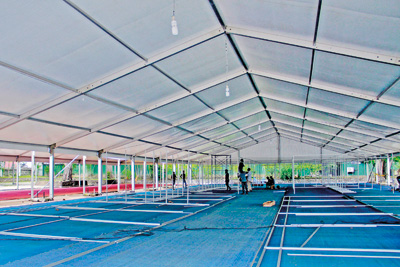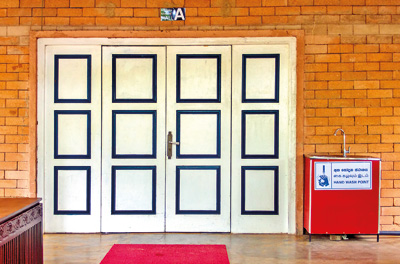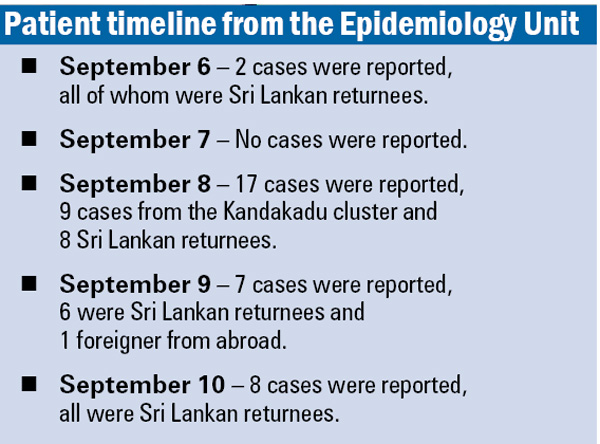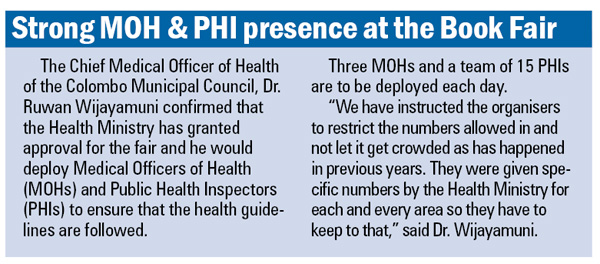News
Book Fair to be held with strict health guidelines in place
The Colombo International Book Fair will be held under strict health measures from September 18-27 from 9 a.m. to 9 p.m. with around 500,000 people walking through the halls of the BMICH, the Sunday Times learns.

Preparations underway for the Book Fair to be held from September 18-27 (above and below). Pix by Sameera Weerasekera
“We have got approval from the Health Ministry to hold the Book Fair,” said the President of the Sri Lanka Book Publishers’ Association, Upali Wanigasooriya, detailing the measures that would be followed to ensure that there is no danger from COVID-19.
The Book Fair is scheduled to be held at the Bandaranaike Memorial International Conference Hall (BMICH), Colombo 7, in the Sirimavo Bandaranaike Memorial Exhibition Centres.
He said that the numbers entering each hall would be restricted – only 300 people would be allowed to enter the biggest hall at a specific time, with only 150 people being allowed in to each smaller hall. Counting machines would be at the entrance to ensure that the numbers are kept to the required limit and there would be no overcrowding.
“Ten university students will man the entry-points to check the temperature of everyone entering the halls and those with fever would be refused entry. Everyone who wishes to enter the fair will have to write his/her name, address, national identity card number and phone number on the rear of the ticket and as an incentive, a draw will be held every hour with prizes being awarded,” he said. 
Mr. Wanigasooriya said that all those visiting the fair will have to wash/clean their hands, for which facilities such as sanitizer would be provided, mandatorily wear a face-mask and keep a one-metre distance. Those who come without face-masks would be able to buy them at a stall where they would be sold at a subsidized rate of Rs. 15 each.
“There will be about 330 stalls. There are no foreign agents running stalls, only local agents. In other years, we get around a million people, but this year we are expecting about 500,000,” he added.
This is the 22nd edition of the Colombo International Book Fair, which has been held annually for 21 years. The Sri Lanka Book Publishers’ Association has advised those who wish to attend the fair to register online, at least a day prior, to gain entry through the express line.
| The MRI’s achievements | |
| The Medical Research Institute (MRI) has validated a serology assay which indicates that there is no cross-reaction of the SARS coronavirus with the human coronavirus and also set in motion two important research studies, while passing the 55,000 RT-PCR test score.This was as the first WHO External Quality Assessment Panel gave a 100% score on the detection of SARS-CoV-2 RT-PCR tests to the laboratories of the MRI and the Karapitiya, Kandy and Anuradhapura Teaching Hospitals. A serology assay was conducted to assess inconclusive RT-PCR test results when there has been exposure to COVID-19; when someone is positive whereas all his/her family members are negative; check the extent of community spread of COVID-19; and in the case of hospitalized patients who continue to be positive over a prolonged period of time, said Consultant Virologist Dr. Jude Jayamaha of the MRI. He said that it was done under the guidance and direction of the Head of the Department of Virology, Dr. Janaki Abeynayake, to find out the specificity and sensitivity of ELISA (Enzyme-linked Immunosorbent Assay) with regard to the COVID-19 antibodies. “We have validated ELIZA and are awaiting the reagent kits from Germany. The finding is that there is no cross-reactivity among fever patients (mainly dengue) in the pre- and post-COVID-19 era,” said Dr. Jayamaha, who explained that what they wanted to find out was whether there was cross-reactivity between SARS-COV-2 before the pandemic. None was found. In the light of questions being raised as to how the new coronavirus seems to be less virulent in Sri Lanka, he said that the MRI is collaborating with the Hong Kong University (Prof. Malik Peiris) on a study titled ‘Phylogenetic analysis of Sri Lankan COVID-19 strains over the past few months to ascertain clades (sub-divisions)’. This study being done over the last six months will sequence the genome of the viruses found in Sri Lanka. The results should be out in 2-3 weeks. Another study to ‘Evaluate anti-viral activity of Ceylon black tea against COVID-19’ is to be launched by the MRI in collaboration with the Tea Research Institute (TRI) with the support of Director Dr. Saman Hettiarachchi and HKU with the assistance of Prof. Malik Peiris. The MRI laboratory has been awarded the second prize in the oral paper presentation category at the annual academic sessions of the Sri Lanka College of Microbiologists, for its paper titled ‘Establishment of in-house PCR assay to detect novel coronavirus’. Meanwhile, the MRI has carried out 55,000 RT-PCR tests of the over 230,000 tests done so far countrywide at the 21 laboratories which include state hospitals and certain universities. “It’s not the number of tests that matter but having a strategy which incorporates the testing of representative samples,” said Dr. Jayamaha. According to him the Health Ministry is doing extensive sampling from the community in every district and also among those in high-risk categories. The MRI has tested prison samples from Mahara and Welikada of those who have been recently remanded, while also testing samples sent by regional epidemiologists who have collected them from fishermen who return after long trips in multi-day trawlers. The MRI has increased its capacity from 400 RT-PCR tests to 500 per day, while also resuming other routine tests (72 in all) including serology and RT-PCR test for transplant patients, hepatitis serology and other viruses.
Vaccines – Sri Lanka has communicated an expression of interestThe Health Ministry has communicated ‘an expression of interest’ to the World Health Organization (WHO) with regard to any effective vaccine which may be produced against COVID-19, Chief Epidemiologist Dr. Sudath Samaraweera said. When asked about the vaccines against COVID-19, Dr. Samaraweera said that the government can purchase any reliable and good vaccine, which gets WHO pre-qualification, directly from the manufacturer. But if the demand from countries is high and the manufacturer cannot meet that demand, there is a facility called COVAX (COVID-19 Vaccines Global Access) which will identify the requirements of each country and share out the vaccine in accordance with the requirement. “COVAX will look at the economic status of a country and if there is a need, either provide the vaccine free or at cost,” he added. Recently, WHO’s Director-General Dr. Tedros Adhanom Ghebreyesus underscored that by pooling resources and acting in solidarity through the ACT (Access to COVID-19 Tools) Accelerator and COVAX Facility, the world can ensure that once a vaccine is available for COVID-19, it would be available equitably to all countries. The ACT Accelerator is a ground-breaking global collaboration to accelerate the development, production and equitable access to COVID-19 tests, treatment and vaccines bringing together governments, scientists, businesses, civil society, philanthropists and global health organizations. A pillar of the ACT Accelerator is COVAX, where countries have the opportunity to benefit from a portfolio of vaccine candidates by having early access to effective vaccines. COVAX will achieve this by acting as a platform that will support the research, development and manufacture of a wide range of COVID-19 vaccine candidates and negotiating their pricing through the support of the Coalition for Epidemic Preparedness Innovations (CEPI), GAVI (the vaccine alliance) and the WHO which are its coordinators. The GAVI Advance Market Commitment for COVID-19 Vaccines (GAVI COVAX AMC) is a financing instrument aimed at incentivising vaccine manufacturers to produce sufficient quantities of eventual COVID-19 vaccines and ensure access for developing countries. Around 92 low and middle-income economies are eligible to get access to COVID-19 vaccines through GAVI COVAX AMC with Sri Lanka being one of them. Currently, 172 countries and multiple candidate vaccines are part of the COVAX Facility. The race for a vaccine Russia’s Sputnik V – Muscovites get the shots On the vaccine front, Russia’s potential vaccine Sputnik V got into Phase III clinical trials, with volunteers from Moscow getting the shot this Wednesday. Forty thousand volunteers of different age and risk groups are to participate in the trial. A study on Sputnik V published in the medical journal ‘Lancet’ on September 4, found that it generated neutralizing antibodies in dozens of study subjects and had only mild side-effects such as fever and headaches on tested participants. The levels of neutralizing antibody response were similar to the immune response that people had after naturally recovering from COVID-19, according to the study. Russia licensed the vaccine for local use in August, the first country to do so and before clinical trial data had been published. Experts said the trials were too small to prove effectiveness and safety. Oxford’s AZD1222 on hold The final trials of the potential vaccine AZD1222 created by the University of Oxford’s Vaccine Group and the British-Swedish company AstraZeneca were put on hold on Wednesday after reports that a volunteer in the United Kingdom (UK) has been diagnosed with transverse myelitis, an inflammatory syndrome that affects the spinal cord. The Phase III trials for this potential vaccine involve around 30,000 volunteers in the UK, United States of America, Brazil and South Africa. China’s “CoronaVac safe for the elderly” Sinovac Biotech Ltd., the Chinese developer of the CoronaVac potential vaccine said on Monday that preliminary results from an early to mid-stage trial showed that it was safe for the elderly. The immune responses triggered in the elderly, however, were slightly weaker than in younger adults. CoronaVac is also being tested in Brazil and Indonesia. It has already been given to tens of thousands of people, including about 90% of Sinovac employees and their families, as part of China’s emergency inoculation scheme.
|



